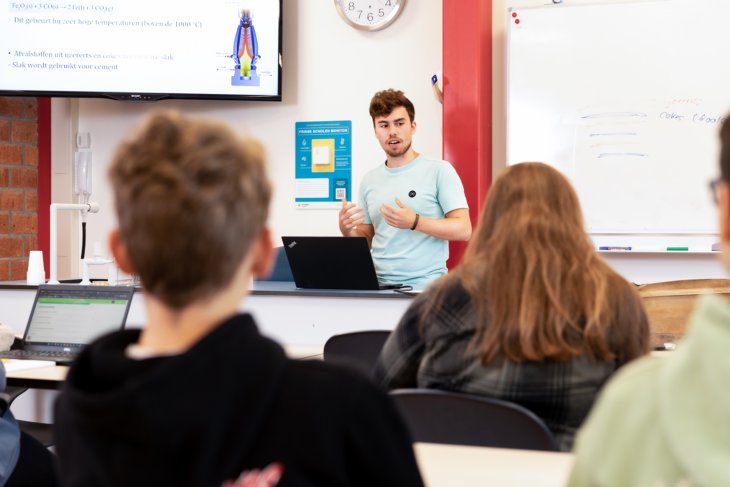Business Days
The Business Days might as well have been called the Business Weeks, as during this event, you can participate in various activities for several weeks to get in touch with companies. The Business Days are more than just a funfair and free snacks on the O&O square. 😉 For instance, you can attend a lunch lecture by an internationally known speaker each year or sharpen your personal skills during the Workshop Weeks. In addition, during the Career Fair you will meet more than 170 companies, with whom you can engage in deeper discussions during the Company Experience Weeks. And the best part? All activities are completely free of charge!
Career Café
Are you curious about where UT alumni ended up after their studies and what their career experiences are? Then the Career Café is for you! At the Career Café, which is organised twice a year (during the spring and fall), you will meet UT alumni working all over the world. In an informal setting, they will share their experiences and give you tips on finding the perfect job. In small groups of up to four students, you can also ask the alumnus all your questions. Don't forget to register in advance!
Career counselling
Would you like to have a one-to-one conversation about your future career? Then make an appointment with a career counsellor at the UT. During an appointment, they will look at your personal situation and provide support in understanding your skills, interests, qualities and motivations, giving you a clearer view of jobs and fields that suit you. You can also have your CV checked here.
Don't have a LinkedIn account yet? My advice: create one as soon as possible! To be honest, until recently I didn't have an account myself either, but now that I have one, it's actually quite useful. On LinkedIn, you can connect with people and companies that are of interest to you. For example, you can see what different people from your field of study are doing and gain more insight into companies you may want to work for later.
In addition, LinkedIn can also help you find a job. You might come across job vacancies, even those not always found on Google. Moreover, by using LinkedIn, you can also be found by employers or recruiters.
Internships and thesis
With a bit of luck, you will have a lot of freedom to choose and organise your own internship during your studies. An internship is the ideal opportunity to explore the work field and get an idea of your future profession. Therefore, choose an internship company and subject that you find interesting, and where you might want to continue with later. You can also do your thesis at a company. Often, students continue working at their internship or thesis company after their graduation, so finding a company that suits you is a must! Besides, these periods also allow you to expand your network, which could benefit you in the future.
Student associations
Study associations often organise all kinds of interesting and useful activities, besides drinks and galas, of course. For instance, through my study association, Paradoks (Technical Medicine and Biomedical Engineering), you can regularly attend lunch lectures, where innovative companies talk about what they are doing. In addition, study associations also organise symposia and company visits, for example, and you can often find job vacancies on their websites.
Workshops and courses
During your studies, but also in your future job, certain skills are indispensable. To develop these, you can take various workshops and courses through the university. Always wanted to learn how to better manage stress? Or how to write a motivation letter, for example? With almost 20 courses to choose from, there is something for everyone. For more practical skills, the DesignLab is the place to be. Here, you can learn 3D printing and laser cutting, for example.
Study-related side job
Student life is obviously not cheap, so a part-time job alongside your studies is not a luxury. While there's nothing wrong with a job that is not at all related to your career, a study-related side job can be very educational. You gain relevant work experience, can apply knowledge from your studies directly in practice, and get to know your future field of work. Additionally, this also helps you build a network. Who knows, your colleagues might be able to help you out in the future!
Conclusion
Preparing for your career while studying may seem challenging, but as you have read, there are various ways to engage with it. I hope that, like me while writing this article, you have gained new insights and inspiration to optimally prepare yourself for what comes after your studies!




